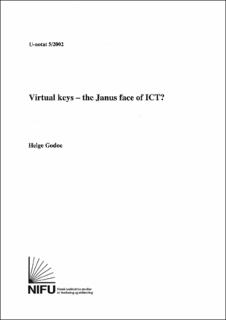| dc.description.abstract | This report attempts to explore new ways of explaining how technology, in particular information and communication technology (ICT), is developed. This is an immense subject; for this reason a compromise has been made in terms of delimitation and focus: The main topic of this report will be the new, ICT-based virtual keys. In brief, the virtual keys are ICTbased regulation technologies, such as embodied in smart cards, PIN codes, biometric keys, cryptographic algorithms, magnetic stripe cards, etc. These technologies have primarily been created and designed in order to control, or regulate, the use of ICT; a virtual key will gi ve users access to an ICT-system and its applications, as evident when a person inserts his or her plastic card in an ATM and enters a PIN code. Broadly following the logic and procedures of a case-study approach, cf. (Yin 1989), the choice of virtual keys as the object of study and analysis is not arbitrary, it is strategic: On the one side, the development of virtual keys is typical of technological construction, design and development; the virtual keys mirror ICT development and diffusion as a technological project. On the other side, the virtual keys are social technologies. Mechanical and information based keys and locks have been in use in societies for thousand of years for social reasons, i.e. to regulate (secure, control, immobilize, keep secret, manage, prevent burglary, etc) whatever various groups and individuals consider valuable or vulnerable. Thus, one may analyze and discuss to what extent the virtual keys are really novel, because many aspects of these bear strong resemblance to antecedents that have existed fora long time prior to the emergence of ICT. This, in turn, may elucidate to what extent ICT has novel social and cultural aspects, i.e. the impact of what designers of technology create and how users, markets and social systems respond to and influence the shaping and design of the virtual keys. In this, an analysis of the diffusion of virtual keys is interesting because this will provide insights into these aspects. For this reason, focus will be set on the design, construction and diffusion of smart cards. | en_US |

